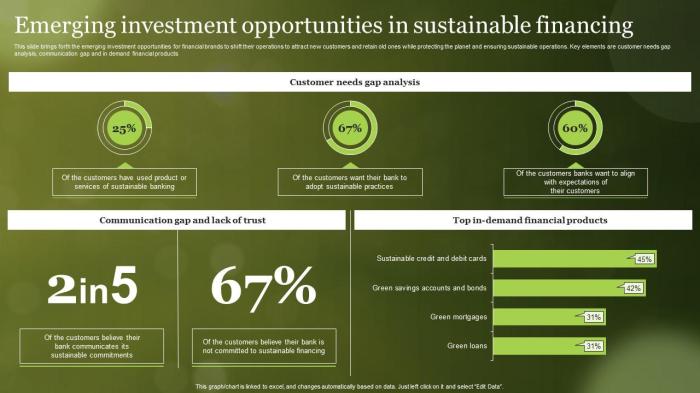
Embark on a journey into the realm of Sustainable Investment Opportunities, where financial growth meets environmental consciousness, paving the way for a greener future.
Delve into the nuances of sustainable investments and discover how they offer a unique avenue for both profit and planet preservation.
Sustainable Investment Opportunities
Investing in sustainable opportunities involves putting financial resources into companies, projects, or initiatives that prioritize environmental, social, and governance (ESG) factors. These opportunities aim to generate long-term value while promoting sustainable practices and positive impacts on society and the environment.
Examples of Sustainable Investment Opportunities
- Renewable Energy: Investing in solar, wind, or hydroelectric power companies that promote clean energy production.
- Sustainable Agriculture: Supporting companies focused on organic farming, regenerative agriculture, and reducing food waste.
- Green Technology: Investing in companies developing innovative solutions for energy efficiency, waste management, and sustainable transportation.
- Impact Investing: Funding projects that address social or environmental challenges while generating financial returns.
Benefits of Investing in Sustainable Opportunities
- Long-Term Returns: Sustainable investments often outperform traditional investments over the long run due to their focus on resilience and responsible practices.
- Risk Mitigation: Companies with strong ESG practices tend to be better equipped to face environmental and social risks, reducing investment risks.
- Positive Impact: By investing in sustainable opportunities, investors can contribute to positive change, supporting a more sustainable and equitable future.
- Brand Reputation: Investing in companies with strong sustainability practices can enhance an investor’s reputation and attract like-minded partners and clients.
Contribution to a Greener Future
Investing in sustainable opportunities plays a crucial role in transitioning towards a greener future by driving innovation, promoting responsible consumption and production, and fostering a more sustainable economy. By directing capital towards companies and initiatives that prioritize sustainability, investors can help accelerate the shift towards a more environmentally conscious and socially responsible world.
Investment Advice
Before delving into the world of investments, it is crucial to seek professional investment advice to make informed decisions that align with your financial goals and risk tolerance.
Investment advice plays a vital role in helping individuals navigate the complex landscape of financial markets, providing insights, strategies, and recommendations tailored to each investor’s unique circumstances.
Role of an Investment Advisor
- An investment advisor acts as a trusted guide, offering personalized financial advice based on your financial objectives, risk tolerance, and time horizon.
- They conduct thorough research, monitor market trends, and provide recommendations on investment opportunities that align with your goals.
- Investment advisors help manage risks by diversifying your portfolio, ensuring a balanced approach to investing.
Choosing a Reliable Investment Advisor
- Look for advisors with relevant credentials, such as Certified Financial Planner (CFP) or Chartered Financial Analyst (CFA) designation.
- Consider the advisor’s experience, track record, and client testimonials to gauge their expertise and reliability.
- Ensure the advisor operates with transparency regarding fees, services offered, and potential conflicts of interest.
- Seek referrals from trusted sources or professionals in the financial industry to find a reputable investment advisor.
Investment Banking

Investment banking plays a crucial role in facilitating sustainable investments by connecting investors with sustainable projects and providing financial advisory services. This sector of banking focuses on raising capital, underwriting securities, and offering financial advice to corporations, governments, and other institutions.
Supporting Clients in Identifying Investment Opportunities
Investment banks support clients in identifying sustainable investment opportunities by conducting thorough market research, financial analysis, and due diligence. They help clients evaluate potential risks and returns associated with sustainable projects, providing valuable insights to make informed investment decisions.
- Advising on Green Bonds: Investment banks assist in structuring and issuing green bonds, which are used to finance environmentally friendly projects such as renewable energy initiatives and sustainable infrastructure.
- Arranging Project Financing: Investment banks help in arranging project financing for sustainable projects, ensuring that the necessary capital is raised to fund initiatives that promote environmental and social sustainability.
- Merger and Acquisition Advisory: Investment banks offer merger and acquisition advisory services to clients looking to invest in or acquire sustainable businesses, facilitating transactions that align with environmental and social goals.
Impact on Sustainable Development
The impact of investment banking on sustainable development is significant, as it channels financial resources towards projects that promote environmental conservation, social responsibility, and economic growth. By supporting sustainable investments, investment banks contribute to the transition towards a more sustainable and resilient global economy.
Investment Horizon
Investment horizon refers to the length of time an investor expects to hold an investment before selling it. It is a crucial factor in sustainable investing as it impacts the ability to achieve long-term sustainability goals and financial returns.
Significance of Investment Horizon in Sustainable Investing
The investment horizon plays a significant role in sustainable investing as it determines the timeframe within which environmental, social, and governance (ESG) factors can generate impact and returns. Longer investment horizons allow for the realization of sustainable goals and positive outcomes for both investors and society.
Variation of Investment Horizon in Different Types of Sustainable Investments
- Long-term sustainable investments, such as renewable energy projects or sustainable infrastructure, typically have investment horizons of 10 years or more.
- Short-term sustainable investments, like green bonds or ESG-focused mutual funds, may have investment horizons ranging from a few months to a few years.
Strategies for Aligning Investment Horizon with Sustainability Goals
- Conduct thorough research on the sustainability performance and long-term prospects of the investment.
- Consider the impact of ESG factors on the investment’s future value and risk profile.
- Regularly review and adjust the investment strategy to ensure alignment with evolving sustainability goals.
Examples of Long-term and Short-term Investment Horizons in Sustainable Investing
- Long-term: Investing in a sustainable real estate project with a 20-year horizon to contribute to urban development and reduce carbon emissions.
- Short-term: Purchasing green bonds with a maturity of 3 years to support renewable energy initiatives and diversify the investment portfolio.
Investment Opportunities
When evaluating investment opportunities, it is crucial to consider various key factors that can impact the success of your investments. Factors such as market trends, risk assessment, financial performance, and potential for growth should all be taken into account before making any investment decisions.
Differences Between Traditional and Sustainable Investment Opportunities
Traditional investment opportunities focus primarily on financial returns without considering the environmental or social impact of the investments. On the other hand, sustainable investment opportunities prioritize investments that not only generate financial returns but also have a positive impact on the environment or society.
Spotting Emerging Sustainable Investment Opportunities
- Stay informed about current environmental and social issues that can create new investment opportunities.
- Research companies and industries that are leading the way in sustainability practices.
- Look for innovative technologies and solutions that address sustainability challenges.
- Monitor regulatory changes and policies that promote sustainable investments.
Diversifying a Portfolio with Sustainable Investment Opportunities
Diversifying your investment portfolio with sustainable opportunities can help reduce risk and maximize returns. By including a mix of traditional and sustainable investments, you can create a well-rounded portfolio that aligns with your financial goals and values.
Investment Strategy

Having a well-defined investment strategy is crucial for sustainable investments as it helps investors navigate the complex landscape of sustainable finance, align their financial goals with environmental and social objectives, and manage risks effectively.
Developing an Investment Strategy
- Conduct thorough research on sustainable investment opportunities in various sectors such as renewable energy, green technology, and impact investing.
- Define clear investment objectives, risk tolerance, and time horizon to tailor the strategy to your specific financial goals.
- Consider integrating environmental, social, and governance (ESG) factors into the investment decision-making process for a more holistic approach.
Successful Investment Strategies in Sustainability
- Impact investing: Investing in companies or projects that generate positive social and environmental impact alongside financial returns.
- Thematic investing: Focusing on specific sustainability themes like clean energy, water conservation, or healthcare innovation to capitalize on emerging trends.
- Engagement strategy: Actively engaging with companies to improve their ESG practices and drive positive change from within.
Adapting to Changing Market Conditions
- Diversify your portfolio to mitigate risks and take advantage of opportunities across different sectors and geographies.
- Stay informed about market trends, regulatory developments, and emerging technologies to adjust your strategy accordingly.
- Regularly review and rebalance your portfolio to ensure it remains aligned with your investment goals and risk profile.
In conclusion, Sustainable Investment Opportunities stand as a beacon of hope for investors looking to make a positive impact on the world while securing their financial future. As we navigate through the intricate landscape of eco-friendly investments, remember that every choice made today shapes the sustainable tomorrow we envision.
Questions and Answers
What are some key industries offering sustainable investment opportunities?
Some key industries include renewable energy, sustainable agriculture, and green technology.
How do sustainable investment opportunities contribute to a greener future?
By supporting environmentally friendly projects, sustainable investments help reduce carbon footprints and promote eco-conscious practices.
What sets apart sustainable investment opportunities from traditional ones?
Sustainable investments prioritize environmental and social impact alongside financial returns, unlike traditional investments solely focused on profits.






